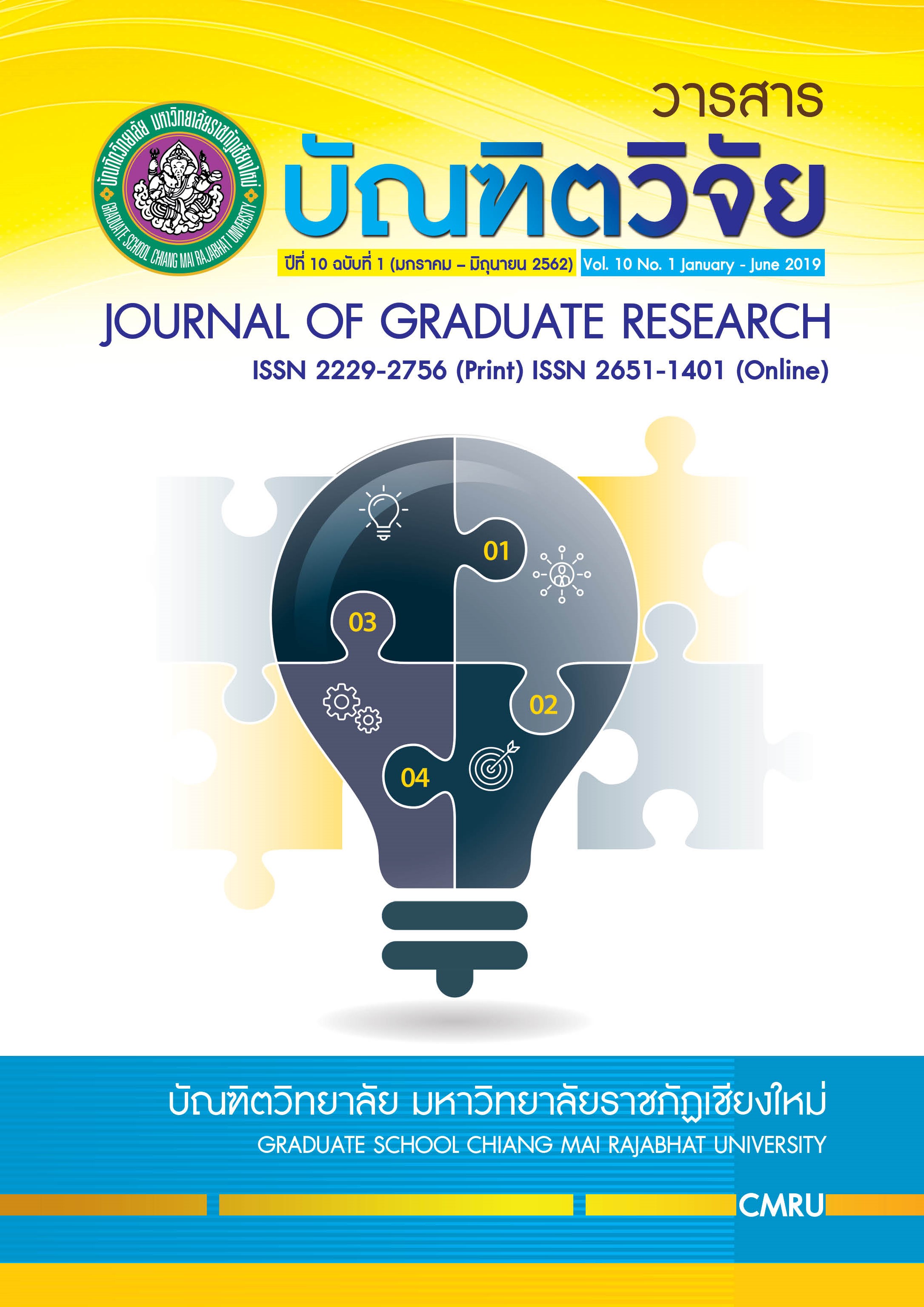พฤติกรรมการเป็นสมาชิกที่ดีต่อองค์การของครูที่ส่งผลต่อความสุขในการทำงานของผู้บริหารโรงเรียนเอกชน สังกัดสำนักงานศึกษาธิการ ภาค 10
Main Article Content
บทคัดย่อ
การวิจัยครั้งนี้มีวัตถุประสงค์เพื่อ 1) ศึกษาระดับพฤติกรรมการเป็นสมาชิกที่ดีต่อองค์การของครูโรงเรียนเอกชน สังกัดสำนักงานศึกษาธิการภาค 10 2) ศึกษาระดับความสุขในการทำงานของผู้บริหารโรงเรียนเอกชน สังกัดสำนักงานศึกษาธิการภาค 10 3) ศึกษาความสัมพันธ์ระหว่างพฤติกรรมการเป็นสมาชิกที่ดีต่อองค์การของครูกับความสุขในการทำงานของผู้บริหารโรงเรียนเอกชน สังกัดสำนักงานศึกษาธิการภาค 10 และ 4) สร้างสมการพยากรณ์ความสุขในการทำงานของผู้บริหารโรงเรียนเอกชน สังกัดสำนักงานศึกษาธิการ ภาค 10 กลุ่มตัวอย่าง คือ ผู้บริหารโรงเรียนเอกชน จำนวน 103 คน ได้มาโดยการสุ่มแบบแบ่งชั้น เครื่องมือที่ใช้ในการวิจัยเป็นแบบสอบถามแบบมาตราส่วนประมาณค่า 5 ระดับ สอบถามเกี่ยวกับพฤติกรรมการเป็นสมาชิกที่ดีต่อองค์การของครู ที่มีค่าความเชื่อมั่นเท่ากับ .93 และค่าอำนาจจำแนกอยู่ระหว่าง .28 - .73 และความสุขในการทำงานของผู้บริหารโรงเรียน ที่มีค่าความเชื่อมั่นเท่ากับ .95 และค่าอำนาจจำแนกอยู่ระหว่าง .28 - .84 วิเคราะห์ข้อมูลโดยใช้การแจกแจงความถี่ ร้อยละ ค่าเฉลี่ย ส่วนเบี่ยงเบนมาตรฐาน สัมประสิทธิ์สหสัมพันธ์ของเพียร์สัน และการวิเคราะห์ถดถอยพหุคูณแบบขั้นตอน
ผลการวิจัยพบว่า 1) พฤติกรรมการเป็นสมาชิกที่ดีต่อองค์การของครู อยู่ในระดับมาก 2) ความสุขในการทำงานของผู้บริหารโรงเรียน อยู่ในระดับมาก 3) พฤติกรรมการเป็นสมาชิกที่ดีต่อองค์การของครูและความสุขในการทำงานของผู้บริหารโรงเรียน มีความสัมพันธ์กันทางบวก และ 4) พฤติกรรมการเป็นสมาชิกที่ดีต่อองค์การของครู ได้แก่ ปัจจัยความอดทนอดกลั้น ปัจจัยการให้ความร่วมมือ และปัจจัยการให้ความช่วยเหลือ เป็นตัวพยากรณ์ความสุขในการทำงานของผู้บริหารโรงเรียนเอกชน สังกัดสำนักงานศึกษาธิการ ภาค 10 โดยมีสัมประสิทธิ์สหสัมพันธ์พหุคูณเท่ากับ .80 (R = .80) ซึ่งสามารถพยากรณ์ความสุขในการทำงานของผู้บริหารโรงเรียนเอกชน สังกัดสำนักงานศึกษาธิการ ภาค 10 ได้ร้อยละ 64.60 (R2 = .646) เป็นดังนี้
สมการพยากรณ์ในรูปแบบคะแนนดิบ
= 0.399 + .394(X3) + .264(X4) + .235 (X1)
= .381(X3) + .362(X4) + .272(X1)
Downloads
Article Details
เอกสารอ้างอิง
ชุมสุข สุขหิ้น. (2553). ปัจจัยที่สัมพันธ์กับความสุขในการทำงานของครูโรงเรียนเอกชน จังหวัดนครศรีธรรมราช. (ปริญญานิพนธ์ปริญญาการศึกษามหาบัณฑิต, สาขาวิชาการบริหารการศึกษา มหาวิทยาลัย
ศรีนครินทรวิโรฒ).
ณรงค์ หลักกำจร. (2548). ทำอย่างไรให้มีความสุข. วารสารกรมประชาสัมพันธ์, (9), 102.
นันทนา ธรรมบุศย์. (2554). การพัฒนาประสิทธิภาพในการทำงาน. วารสารแนะแนว, 31(166), 25 – 30.
นันทรัตน์ อุ่ยประเสริฐ. (2552). ความสุขในการทำงานของพนักงานบริษัท เฟิสท์ดรัก จำกัด จังหวัดเชียงใหม่.
(การค้นคว้าแบบอิสระบริหารธุรกิจมหาบัณฑิต, สาขาวิชาการบริหารธุรกิจ มหาวิทยาลัยเชียงใหม่).
เบญจวรรณ มาลัยรุ่งสกุล. (2552). ปัจจัยสิ่งแวดล้อมกับความสุขในการทำงานของพยาบาลวิชาชีพในโรงพยาบาลมหาวิยาลัยของรัฐ. (วิทยานิพนธ์พยาบาลศาสตรมหาบัณฑิต, สาขาวิชาการบริหารการพยาบาล มหาวิทยาลัยเชียงใหม่).
ประไพพร สิงหเดช. (2549). การศึกษาคุณลักษณะบุคลากรที่มีต่อคุณภาพชีวิตในการทางานและพฤติกรรมการเป็นสมาชิกที่ดีต่อองค์การ: ศึกษากรณีข้าราชการกรมคุมประพฤติ. (วิทยานิพนธ์ศิลปศาสตรมหาบัณฑิต, สาขาจิตวิทยาอุตสาหกรรม มหาวิทยาลัยธรรมศาสตร์).
ปิยอร ลีระเติมพงษ์. (2552). ความสุขในการทำงานของพยาบาล งานการพยาบาลศัลยศาสตร์ และศัลยศาสตร์ออร์โธปิดิกส์ โรงพยาบาลศิริราช. (การค้นคว้าอิสระวิทยาศาสตรมหาบัณฑิต, สาขาวิชาวิทยาการสังคมและการจัดการระบบสุขภาพ มหาวิทยาลัยศิลปากร).
ภูริชญา ยิ้มแย้ม. (2556). โมเดลความสัมพันธ์เชิงสาเหตุของความสุขในการทำงานของครูโรงเรียนเทศบาล สังกัดองค์กรปกครองส่วนท้องถิ่น. วารสารบริหารการศึกษา มศว, 10(19), 1 – 13.
รัทพล จิตตะวิกูล. (2553). การรับรู้ความปลอดภัยในการทำงานและความสัมพันธ์กับหัวหน้างานที่มีผลต่อความสุขในการทำงานของพนักงานระดับปฏิบัติการ. วารสารวิชาการพระจอมเกล้าพระนครเหนือ, 20(3), 562 – 570.
ศุภากร ทัศน์ศรี. (2554). ความสัมพันธ์ระหว่างความผูกพันต่อองค์การและพฤติกรรมการเป็นสมาชิกที่ดีต่อองค์การของครู สังกัดสถานศึกษาขั้นพื้นฐาน สำนักงานเขตพื้นที่การศึกษาประถมศึกษาราชบุรี เขต 1. (วิทยานิพนธ์ครุศาสตรมหาบัณฑิต, สาขาวิชาการบริหารการศึกษา มหาวิทยาลัยราชภัฏเพชรบุรี).
สิรินทร แช่ฉั่ว. (2553). ความสุขในการทำงานของบุคลากรเชิงสร้างสรรค์: กรณีศึกษาอุตสาหกรรมเชิงสร้างสรรค์กลุ่มสื่อและกลุ่มงานสร้างสรรค์เพื่อการใช้งาน. (วิทยานิพนธ์วิทยาศาสตรมหาบัณฑิต, สาขาวิชาการพัฒนาทรัพยากรมนุษย์และองค์การ สถาบันบัณฑิตพัฒนาบริหารศาสตร์).
สุกัญญา อินต๊ะโดด. (2550). ความสัมพันธ์ระหว่างพฤติกรรมการเป็นสมาชิกที่ดีขององค์การความต้องการมีส่วนร่วมในองค์การและความสุขในการทำงาน: กรณีศึกษาอุตสาหกรรมสิ่งทอ ในเขตภาคเหนือตอนบน. (วิทยานิพนธ์วิทยาศาสตรมหาบัณฑิต, สาขาวิชาจิตวิทยาอุตสาหกรรมและองค์การ มหาวิทยาลัยรามคำแหง).
สุพรรณา ประทุมวัน. (2547). คุณภาพชีวิตในการทำงานที่มีผลต่อพฤติกรรมการเป็นสมาชิกที่ดีขององค์การและผลการปฏิบัติงานของพนักงานโรงงานผลิตสายพานยาง. (วิทยานิพนธ์วิทยาศาสตรมหาบัณฑิต, สาขาวิชาจิตวิทยาอุตสาหกรรม มหาวิทยาลัยเกษตรศาสตร์).
อรรณพ จีนะวัฒน์. (2559). การพัฒนาตนเองของผู้ประกอบวิชาชีพครู. Veridian E – Journal, Silpakorn University, 9(2), 1379 – 1395.
อัชฌา ชื่นบุญ, รุ่งฤดี โลลุวิวัฒน์, ศราวุธ มั่งสูงเนิน, จิราภรณ์ โภชกปริภัณฑ์ และ สุนทร ช่องชนิล. (2556). ปัจจัยที่ส่งผลต่อความสุขในการทำงานของบุคลากรในโรงพยาบาลเซนต์เมรี่. วารสารปัญญาภิวัฒน์, 4(1), 73 – 85.
Brunetto, Y., Shriberg, A., Farr-Wharton, R., Shacklock, K., Newman, S. & Dienger, J. (2013). The Importance of Supervisor-nurse relationships, Teamwork, Wellbeing, affective Commitment and retention of North American Nurses. Journal of Nursing Management, (21), 827 – 837.
Diener, E. (2003). The scientific understanding of happiness methods for measuring subjective well-being. Retrieved from https://google.com
Deshpande, R. L., (2002). Human Resource Development. Ohio: Mike Roche.
Desimone, R. L. (2002). Human resource development. Ohio: Mike Roche.
Furnham, A., & Brewin, C. J. (2003). Personality and happiness. Personality and Individual Difference, (11), 1093-1096.
Graham, H. (2007). Unequal Lives: Health and Socioeconomic Inequalities. Buckingham: Open University Press.
Greenberg, J. & Baron, R. A. (2002). Behavior in organizations. 4th ed. Boston: Allyn and Bacon.
Katz, P. S. (2006). Evolution and development of neural circuits in invertebrates. Current Opinion in Neurobiology, 17(1), 59-64.
Katz, D. & Kahn, R. L. (2004). The Social Psychology of Organizations. New York: Wiley.
Krejcie, R. V. & Morgan, D. W. (1970). Determining Sample Size for Research Activities. Educational and Psychological Measurement, 30(3), 607-610.
Manion, J. (2003). Joy at work: creating a positive workplace. Journal of Nursing Administration, (12), 652.
Malekiha, M., & Abedi, M. R. (2014). The Relationship between Work engagement and Happiness among Nurses in Iran. Reef Resources Assessment and Management Technical Paper, (40), 809 – 816.
Organ, D. W. (2005). Organizational citizenship behavior : The good soldier syndrome. Massachusetts: Heath & Company.
Organ, D.W., & Konovsky, M. (2005). Cognitive versus affective determinants of organizational citizenship behavior. Journal of Applied Psychology, (74), 157-164.
Organ, D.W., Podsakoff, P.M., & Mackenzie, S.B. (2005). Organizational citizenship. Behavior its nature, Antecedents, and consequences. London: SAGE Publications.
Organ, D. W. & Ryan, K. (2005). A meta-analytic review of attitudinal and dispositional predictors of organizational citizenship behaviors. Personnel Psychology, (48), 755-802.
Podsakoff, P. M. & Mackenzie, S. B. (2005). Organizational citizenship behavior and the quantity and quality of work group performance. Journal of Applied Psychology, 82(2), 123 – 128.
Schnake. M., & Dumler, M.P. (2004). Organizational citizenship behavior: The impact of rewards and reward practice. Journal of Managerial Issues, 9, 216-229.
Warr, P. (1990). The Measurement of Well – being and Other Aspects of Mental Health. Journal of Occupational Psychology, (63), 193 – 210.
Warr, P. (2007). Work Happiness and Unhappiness. New Jersey: Lawrence Erlbaum Associates.


